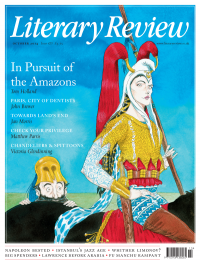Kate Saunders
Secret Lives
The Bone Clocks
By David Mitchell
Sceptre 595pp £20
Like David Mitchell’s Booker-shortlisted Cloud Atlas from 2004, his latest novel, The Bone Clocks, is a terrific feat of literary engineering. The first section of the book is the least successful. It’s 1984 and fifteen-year-old Holly Sykes, who lives in a pub in Gravesend, runs away after a row with her mother. Holly is an ordinary teenager, but there is something very odd lurking in her background. As a little girl she heard voices in her head, and an icy blonde woman appeared at the end of her bed; she gave her name as ‘Miss Constantin’. Eventually, a mysterious Dr Marinus banished the voices inside Holly, apparently with a few waves of the hand.
Mitchell is a storyteller of extraordinary skill, but he never entirely gets inside the head of his teenage heroine. Holly comes across as your stock ‘feisty urchin’, with a hint of Lyra from Philip Pullman’s His Dark Materials; there’s also something middle-aged about her would-be wisecracking exchanges with other teenagers.

Sign Up to our newsletter
Receive free articles, highlights from the archive, news, details of prizes, and much more.@Lit_Review
Follow Literary Review on Twitter
Twitter Feed
How to ruin a film - a short guide by @TWHodgkinson:
Thomas W Hodgkinson - There Was No Sorcerer
Thomas W Hodgkinson: There Was No Sorcerer - Box Office Poison: Hollywood’s Story in a Century of Flops by Tim Robey
literaryreview.co.uk
How to ruin a film - a short guide by @TWHodgkinson:
Thomas W Hodgkinson - There Was No Sorcerer
Thomas W Hodgkinson: There Was No Sorcerer - Box Office Poison: Hollywood’s Story in a Century of Flops by Tim Robey
literaryreview.co.uk
Give the gift that lasts all year with a subscription to Literary Review. Save up to 35% on the cover price when you visit us at https://literaryreview.co.uk/subscribe and enter the code 'XMAS24'